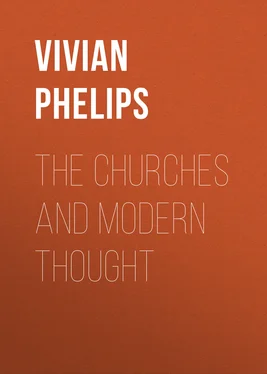Vivian Phelips - The Churches and Modern Thought
Здесь есть возможность читать онлайн «Vivian Phelips - The Churches and Modern Thought» — ознакомительный отрывок электронной книги совершенно бесплатно, а после прочтения отрывка купить полную версию. В некоторых случаях можно слушать аудио, скачать через торрент в формате fb2 и присутствует краткое содержание. Жанр: foreign_prose, foreign_religion, Философия, foreign_antique, на английском языке. Описание произведения, (предисловие) а так же отзывы посетителей доступны на портале библиотеки ЛибКат.
- Название:The Churches and Modern Thought
- Автор:
- Жанр:
- Год:неизвестен
- ISBN:нет данных
- Рейтинг книги:4 / 5. Голосов: 1
-
Избранное:Добавить в избранное
- Отзывы:
-
Ваша оценка:
- 80
- 1
- 2
- 3
- 4
- 5
The Churches and Modern Thought: краткое содержание, описание и аннотация
Предлагаем к чтению аннотацию, описание, краткое содержание или предисловие (зависит от того, что написал сам автор книги «The Churches and Modern Thought»). Если вы не нашли необходимую информацию о книге — напишите в комментариях, мы постараемся отыскать её.
The Churches and Modern Thought — читать онлайн ознакомительный отрывок
Ниже представлен текст книги, разбитый по страницам. Система сохранения места последней прочитанной страницы, позволяет с удобством читать онлайн бесплатно книгу «The Churches and Modern Thought», без необходимости каждый раз заново искать на чём Вы остановились. Поставьте закладку, и сможете в любой момент перейти на страницу, на которой закончили чтение.
Интервал:
Закладка:
§ 2. The Attitude of the Laity
Let us commence, then, with the sceptical. They are not inclined, for the present at least, to propagate their views. Rightly or wrongly, they still hold the popular opinion that, while they themselves can dispense with belief, the masses cannot. All that is asked of a “cultured” man is that he keep his opinion to himself. He may be an agnostic or—whether he realises it or not—practically an atheist; but he must not think of calling himself by such ugly names. “The uneducated freethinker,” our modern philosopher will say, “manifests a Philistine Voltaireanism—a spirit now disapproved by scholars and philosophers, who regard with serious consideration all the manifestations and products of human thought, from the earliest fetichism to the most recent developments of that religious tendency which appears to be a constitutional element in man.” Such high thoughts, according to this philosopher, are not for the common herd, who must continue to wallow in their ignorance, feeding on husks, which, however unsuitable for his own refined digestion, will serve well enough to nourish the religious instincts of the masses.
If of a mystical turn of mind, he will tell you that Christianity, like all other religions, may be but a symbol of a great Reality; and this person, though sceptical regarding the Christian dogmas, will possibly consider himself a Christian. Or, again, he may be without any leaning towards mysticism, and merely hold that religion, if sincere , is better for the mind than scepticism. “Better a belated and imperfect religion,” he will say, “than none at all. The heart has its claims on our consideration as well as the intellect. Study Comte’s General View of Positivism .”
Many agnostics are just as firmly convinced as believers that their country’s prosperity is bound up with the Christian belief. This is largely due to their still clinging to the Church’s teaching concerning belief and morals. It is well to remember, however, that the feeling on this point of the average cultured Frenchman or Italian is quite the opposite. The measures now being taken by the French Government against the clergy are based upon the contention that the Church’s influence is injurious to the State’s welfare; and this feeling has reached such a pitch that Republican employees hardly dare admit their attendance at divine worship. During September, 1904, the Italian Government extended a cordial welcome to a Freethought Congress, and the proceedings were opened by the Minister of Public Instruction. But the average Englishman, be he ever so sure of the falsity of the Christian dogmas, can foresee nothing but immorality and anarchy as the result of the overthrow of Christianity. “ Cui bono? ” “ Quo vadis? ” he cries. “Leave well alone!” “It is easy enough to show that Christianity is false, but what have you to put in its place? What we want now is construction, not criticism and the flogging of a dying creed.” He forgets, it seems to me, that people cannot be hoodwinked for ever, and that, as Mr. Froude tells us, the Reformation was brought about by people refusing any longer to believe a lie. In addition to this concern for the public weal, the sceptic is influenced by motives of expediency. He is well aware of the odium he would incur should he proclaim his heterodox views concerning the popular religion. Such publicity might spoil his professional career, be the death-blow of his ambitions, cause him considerable pecuniary loss, alienate the friends he most values, and, worst of all, destroy the happiness of his home life. For these and similar reasons we find, in the case of the half-believer, that he does not care to verify his doubts, but prefers to leave his opinions vague enough to be able to call himself a broad-minded Christian. Whether half-believing or distinctly agnostic, he usually holds that very common opinion regarding women, children, and religion—that, however little store a man may set by belief, it is wise to encourage it in the women folk, and also to hand over the children to them for their religious instruction. Besides, militant agnosticism is not the fashion. It is looked upon as “bad form,” or as smacking of socialism. Indifference is much the easier attitude.
Or, again, the average man is disposed to trust to the progress of science and the ultimate triumph of truth, and sees no reason why he should make any effort towards shortening the period of transition. In his contempt for the efforts of the “lowly born” and indigent secularists, he forgets that the greatest changes in the world’s history have been brought about from the smallest beginnings by these very “lower orders” he affects to despise. In our own times, was it not working men who first set in motion a revolution that will eventually reform Russia? Perhaps the commonest attitude of “the man in the street,” whatever his manner of belief may be, is one of good-natured indifference—an acquiescence in things as they are. Absence of the critical spirit or of anxious-mindedness, or of both, renders it easy for him to take things as he finds them, much after the manner of his primeval ancestors. His mind will not occupy itself with aught but the present. Naturally, too, he feels very strongly that what appears to make others happy should not be disturbed. In all this he makes various questionable assumptions, which I am considering in subsequent chapters of this book.
It is unnecessary to refer to the opinions of the militant agnostic, as this type could never be accused of deceiving the Church. However, it maybe noted that Mr. Blatchford says, in the Clarion of February 3rd, 1905: “So far as I am concerned, I attacked religion because I believe it to be untrue, and because it seems to me to bar the way to liberty and happiness. The attack upon religion is a part of a task I have set myself.” There are statesmen and other persons of influence who are as incredulous as Mr. Blatchford regarding the truth of Christianity; but they do not, apparently, hold that Christianity bars the way to liberty and happiness (I give them credit for being ruled by the highest motives), and so the Church has their support. It is a weird arrangement between Unbelief and Belief, which cannot possibly last much longer; meanwhile, it tends to confuse and delay the answer to that gravest of questions: “Is Christianity true?”
Leaving the sceptic, let us examine another extremely common type—the man who is under the impression that he is a Christian, without either being particularly devout or having inquired at all deeply into the grounds of his faith. He is ignorant of the causes for doubt, because he has not had, or has not cared to afford, any time for such matters. I do not refer so much to the masses, who obviously have very little leisure, but to the more leisured and influential classes. Such a man’s scientific education, if he ever had any, was broken off early in life. A large proportion of those all-important years of his boyhood were devoted probably to an unwilling study of the “humanities.” His faith is decidedly vague, and according to his own peculiar interpretation, an adjustment between his heavenly aspirations and his earthly inclinations. It has never been thought out, and is not the result of a thorough study of its tenets. He was born and bred a Christian, and all the nicest people he knows are Christians, or he thinks they are. He is, all unconsciously, a social chameleon taking his colour from the conditions in the midst of which he happens to live. He, too, like his heterodox brother, sneers at organised Freethought in this country, because it owes its inception and conduct chiefly to poor and lowly men, forgetting that it was from such a source that the mighty creed of Christendom itself arose. He forgets that the first Christian apostles were mostly working men. If he has heard or read anything of a sceptical nature, he has never stopped to inquire any further into it. He has no idea that the central features of the Bible have been attacked by men of the greatest learning and integrity, with the result that even the defenders of the faith ask for a reverent agnosticism as to the historical circumstances out of which, in the first instance, belief in the resurrection of Jesus Christ arose. 8 8 See pp. 63–4.
Not knowing that the essentials are called in question, he sees no reason to trouble himself about mere details. It is enough for him that he feels sure that there must be some object in our existence, and that there must be a First Cause. It never occurs to him to consider whether his and the Christian conception of God can be reconciled. For him the truth of the Christian dogma is proved sufficiently by the unsatisfying nature of materialism. Has he not been taught that he must have faith, and that faith is a feeling of trust divinely implanted, and not needing to be fed on evidences? Is not Christianity the civilising agent of the world, and the origin of all morality and all good works? Does not scepticism lead to atheism? If thought only leads to disbelief in God, he for one is not going to think.
Интервал:
Закладка:
Похожие книги на «The Churches and Modern Thought»
Представляем Вашему вниманию похожие книги на «The Churches and Modern Thought» списком для выбора. Мы отобрали схожую по названию и смыслу литературу в надежде предоставить читателям больше вариантов отыскать новые, интересные, ещё непрочитанные произведения.
Обсуждение, отзывы о книге «The Churches and Modern Thought» и просто собственные мнения читателей. Оставьте ваши комментарии, напишите, что Вы думаете о произведении, его смысле или главных героях. Укажите что конкретно понравилось, а что нет, и почему Вы так считаете.












